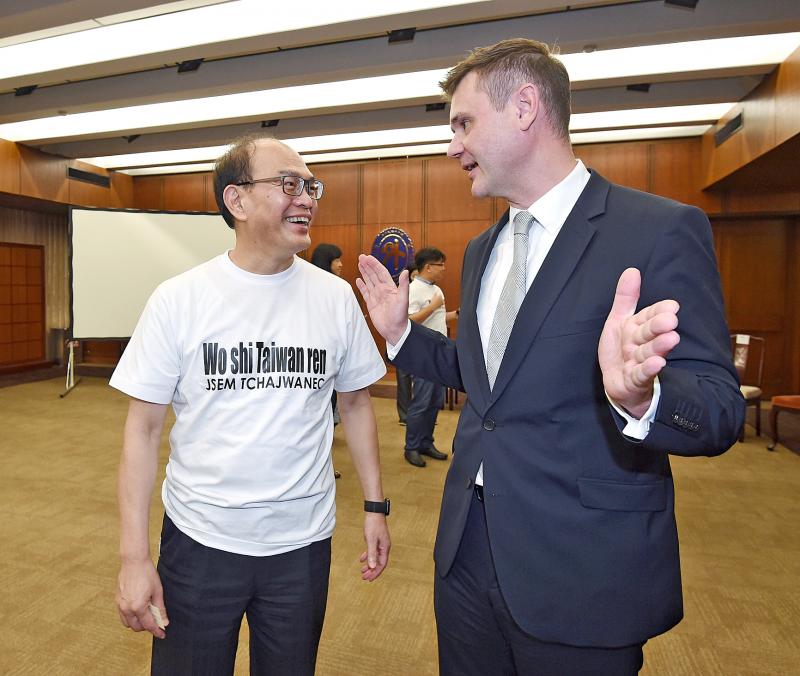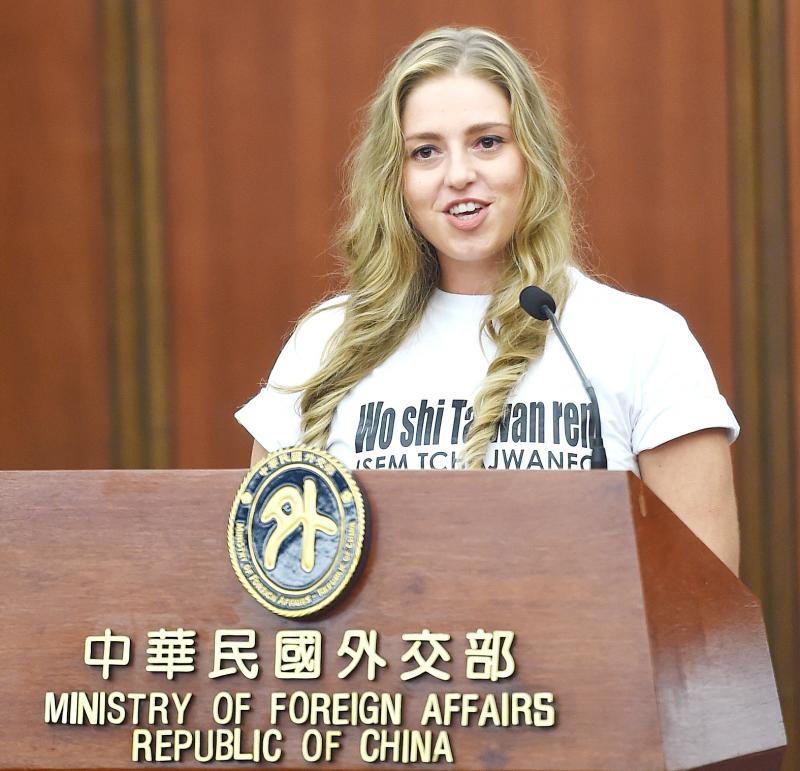Seven Taiwanese universities are to offer 50 scholarships for Czech nationals to study Chinese in Taiwan, one of the achievements of a visit by a delegation headed by Czech Senate President Milos Vystrcil, the Ministry of Foreign Affairs said yesterday.
Deputy Minister of Foreign Affairs Harry Tseng (曾厚仁) and university representatives, wearing T-shirts emblazoned with the words “I am Taiwanese” in Romanized Chinese and Czech, revealed details about the scholarships at a news conference in Taipei.
“I am Taiwanese” refers to a statement Vystrcil made in a speech on Sept. 1 at the Legislative Yuan.

Photo: Liu Hsin-de, Taipei Times
Just as former US president John F. Kennedy supported West Berlin’s pursuit of freedom by proclaiming “Ich bin ein Berliner,” Vystrcil at the time said that he would also like to express his support for Taiwan and freedom with a more humble, but equally strong statement: “I am Taiwanese.”
Tseng thanked Vystrcil and other Czech representatives again for visiting Taiwan from Aug. 30 to Sept. 4, despite pressure from China.
As one of the 22 achievements made by the Czech delegation, the scholarships would be offered by Tunghai University, National Tsing Hua University, National Chengchi University, National Cheng Kung University, National Sun Yat-sen University, Fu Jen Catholic University and Providence University, the ministry said.

Photo: Liu Hsin-de, Taipei Times
Speaking in a videoconference, University of Chemistry and Technology Prague rector Pavel Matejka, who also visited Taiwan with Vystrcil, thanked the ministry for realizing its promise to expand academic cooperation between the two countries.
All of the schools have Chinese language centers recommended by the Ministry of Education, Department of European Affairs Director-General Johnson Chiang (姜森) said.
The scholarships, starting from next year, are to be distributed among the seven universities, which are to decide the conditions and qualifications for selecting applicants, he said.
The schools are to submit their proposals to the ministry, which would offer subsidies for the program, he said, without elaborating on the duration of the scholarships or the amount of the subsidies.
While the ministry has demonstrated its goodwill, it could have presented a more detailed plan or discussed it with the Ministry of Education before announcing it, a source familiar with the matter said.
While the seven schools have submitted their plans, it is not clear why the ministry chose those seven over others that also have Chinese language centers, the source said.
It is also not clear how extensive or how long the program would be, the person said.
If the announcement is intended to be “a gift” for Vystrcil prior to the Czech Senate election on Friday and Saturday, it should have been better planned to become a sustainable project that could benefit more universities, the source added.
Hasty planning might turn the program into a political show without sustainable funding, the source said.
Taiwan is a better place than China for learning Chinese due to its democracy and freedom, while preserving traditional Chinese culture better than many other places in China, Fu Jen Catholic University vice president for mission Leszek Niewdana said.

ROLLER-COASTER RIDE: More than five earthquakes ranging from magnitude 4.4 to 5.5 on the Richter scale shook eastern Taiwan in rapid succession yesterday afternoon Back-to-back weather fronts are forecast to hit Taiwan this week, resulting in rain across the nation in the coming days, the Central Weather Administration said yesterday, as it also warned residents in mountainous regions to be wary of landslides and rockfalls. As the first front approached, sporadic rainfall began in central and northern parts of Taiwan yesterday, the agency said, adding that rain is forecast to intensify in those regions today, while brief showers would also affect other parts of the nation. A second weather system is forecast to arrive on Thursday, bringing additional rain to the whole nation until Sunday, it

LANDSLIDES POSSIBLE: The agency advised the public to avoid visiting mountainous regions due to more expected aftershocks and rainfall from a series of weather fronts A series of earthquakes over the past few days were likely aftershocks of the April 3 earthquake in Hualien County, with further aftershocks to be expected for up to a year, the Central Weather Administration (CWA) said yesterday. Based on the nation’s experience after the quake on Sept. 21, 1999, more aftershocks are possible over the next six months to a year, the agency said. A total of 103 earthquakes of magnitude 4 on the local magnitude scale or higher hit Hualien County from 5:08pm on Monday to 10:27am yesterday, with 27 of them exceeding magnitude 5. They included two, of magnitude

CONDITIONAL: The PRC imposes secret requirements that the funding it provides cannot be spent in states with diplomatic relations with Taiwan, Emma Reilly said China has been bribing UN officials to obtain “special benefits” and to block funding from countries that have diplomatic ties with Taiwan, a former UN employee told the British House of Commons on Tuesday. At a House of Commons Foreign Affairs Committee hearing into “international relations within the multilateral system,” former Office of the UN High Commissioner for Human Rights (OHCHR) employee Emma Reilly said in a written statement that “Beijing paid bribes to the two successive Presidents of the [UN] General Assembly” during the two-year negotiation of the Sustainable Development Goals. Another way China exercises influence within the UN Secretariat is

Taiwan’s first drag queen to compete on the internationally acclaimed RuPaul’s Drag Race, Nymphia Wind (妮妃雅), was on Friday crowned the “Next Drag Superstar.” Dressed in a sparkling banana dress, Nymphia Wind swept onto the stage for the final, and stole the show. “Taiwan this is for you,” she said right after show host RuPaul announced her as the winner. “To those who feel like they don’t belong, just remember to live fearlessly and to live their truth,” she said on stage. One of the frontrunners for the past 15 episodes, the 28-year-old breezed through to the final after weeks of showcasing her unique